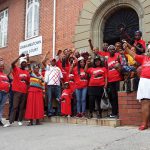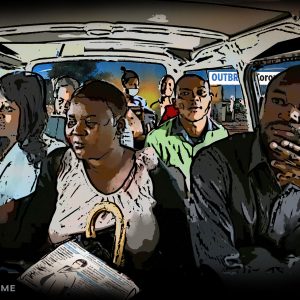Coronavirus a huge threat to water-scarce Makhanda
The university town’s municipal council should step down at once in the wake of the ongoing water crisis, which could doom efforts to prevent the spread of Covid-19.
Author:
18 March 2020

Unless the Makana municipality’s council steps aside immediately, as has been ordered by the high court, the university town of Makhanda in the Eastern Cape could become the site of a mass coronavirus outbreak because of its failed water system, the Unemployed Peoples’ Movement (UPM) says.
Officially, water in the town is supposed to be restricted to 25 litres per person per day and cut off every third day. But in the townships of Fingo, Tantyi and Joza water is completely cut off for up to five days at a time, says UPM spokesperson Ayanda Kota.
The Makana municipal council was dissolved by the high court two months ago after an application by the UPM. By now, councillors should have been well on their way to vacating their seats because after a municipality is dissolved, a by-election must be held within three months. However, the ANC-run council decided to appeal against the ruling and the case will only be heard on 2 April 2020.
Related article:
One of the reasons for the dissolution of the council was because it failed to maintain Makhanda’s water system, which virtually collapsed. A year ago, the Daily Dispatch newspaper reported that suppliers of treatment chemicals had not been paid and had stopped supplying the essential chemicals, the equipment for water quality testing was “totally dysfunctional”, and key equipment had failed. The municipality had failed to repair critical water pipes as well as the system which should have been purifying the water with chlorine, leading to a foul-smelling, brown output that was undrinkable.
Kota says although Makhanda residents have been suffering through water cuts for a long time, the coronavirus has exacerbated their concerns. The UPM believes the Makana council needs to abandon its court appeal and step down now so that a new council can be elected next month.
“We are told to sanitise and wash our hands and yet we don’t have water; our taps are dry. All the township areas were without water for five days last week, and this is a regular event. Clearly, we are in trouble,” said Kota. “Public trust in our healthcare system has been eroded. The health system in Makhanda has collapsed.”
Kota said these extreme water cuts make washing hands with soap and water for 20 seconds impossible because people are already struggling to get enough clean water for basic drinking and cooking.
Limited options for impoverished people
In Makhanda, people have only three options to get clean water. The first is the most costly: buying a large water tank to connect to the house and purchasing clean water privately. This option is not in use by students or township residents, who use option two: standing in long queues at a natural spring just outside the town, near the N2 highway. The queue is crowded and people stand cheek by jowl while grappling with multiple large containers for the pure water that is free of charge.
The third option, used by Makhanda’s working-class residents, is to buy drinking and cooking water from tanks of filtered municipal water inside the town’s busy Pick n Pay store. The three large water containers are also marked by queues of people filling their own bottles with purified drinking water at R1 per litre – all of them pressing down on the same three nozzles.
Both the last two scenarios are disastrous in the context of the coronavirus. People packed together so tightly who handle the same equipment could see dozens of them being infected within minutes.
Related article:
In the small rural town of Alicedale, 53km away, there is no supply of running water at all, says Kota. This town also falls under the Makana municipality.
The university currently known as Rhodes first cancelled all classes this week and began installing new hand-sanitiser dispensers across campus, as well as a backup water supply for the bathrooms in the university that usually experience water cutoffs (the university has its own water supply for most buildings). However, just one day after doing this, perhaps realising the extent of the water crisis, vice-chancellor Sizwe Mabizela had closed the university entirely, ordering that all students vacate residences by 20 March and come back only on 14 April.
At the time of publishing, Makana municipality had not released any information on how it planned to deal with the coronavirus. When asked for details of its coronavirus plan, Gubevu Maduna, the municipality’s manager of water and sanitation, would only say that water had been restored to the townships. He refused to comment on why it was regularly cut off for five days at a time.
Makana spokesperson Yoliswa Ramokolo denied that this was happening at all. “We are supplying water to everybody now. It is because of the drought that we have two-days-on, one-day-off water restrictions.” Asked whether these water restrictions would continue even though residents need a constant water supply in order to wash their hands, Ramokolo would only say the municipality’s coronavirus plan would be communicated “in due time”. She would not specify when this would be, only saying “when the time comes”.
Hard choices for informal sector
Washing hands and having the ability to socially distance oneself from others are crucial to preventing the spread of the virus. Social distancing includes working from home. If the number of cases reaches the thousands, people may even be asked to self-isolate. But Dr Leslie London, a steering committee member of the People’s Health Movement South Africa, cautioned that thousands of South Africans will not have the option to work from home or self-isolate.
“People who work in the informal sector have no self-isolation to fall back on – no work, no income. So we can expect the informal sector to continue operating, meaning opportunities for transmission will continue,” London told New Frame.
He said the government must look at funding paid time off for people who would otherwise not be able to stay at home.
Related article:
“People who have paid jobs – wages or salaries – will be unevenly covered. Some employers will help to absorb the financial shock, others will simply say they can’t afford it and so it is no work, no pay. Maybe [the government] can ‘borrow’ from some existing government fund, for example, the bankrupt Road Accident Fund or the dysfunctional [Workmen] Compensation Fund, or the Government Employment Pension Fund that [trade union federation] Cosatu wants to raid to rescue Eskom, to cover this shortfall,” London said.
Vishwas Satgar, associate professor of international relations at the University of the Witwatersrand, said “relatively affluent societies like China and Italy have been ravaged. We are a middle-income country with deep inequalities and constraints, including weakened and looted state institutions. The full government response regarding specific ministries, including a macro-economic response, still has to be spelt out. There is nothing wrong with anyone calling for more to be done to limit and prevent harm. Like climate injustice, there will be coronavirus injustice. We must speak up on this wherever it manifests.”



